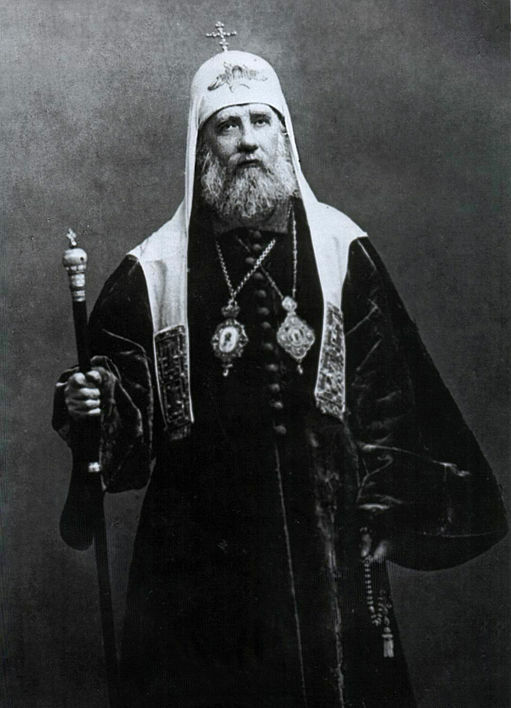Vasily Ivanovich Belavin was born on January 19, 1865 in the city of Toropets, Pskov province, in the family of a priest. In 1878 he graduated from the Toropetsk Theological School and entered the Pskov Theological Academy, then continued his studies at the St. Petersburg Theological Academy. In 1888, Belavin received his Ph.D. in theology. By order of the chief prosecutor of the Holy Synod, in 1888 he was appointed teacher of basic, dogmatic and moral theology at the Pskov Theological Seminary. In December 1891, Belavin was tonsured a monk with the name Tikhon. He was also ordained to the rank of hierodeacon, and later to the rank of presbyter. From March 1892, he was appointed by the decree of the Holy Synod as an inspector of the Kholmskaya Seminary. Later, Tikhon became the rector of this seminary and was elevated to the rank of archimandrite. On October 4, 1897, in the Alexander Nevsky Lavra in St. Petersburg, Tikhon was consecrated Bishop of Lublin, vicar of the Kholm diocese. A year later he was appointed Bishop of the Aleutian and Alaska. In 1900, Tikhon became Bishop of the Aleutian and North American. Under the leadership of Bishop Tikhon, many Orthodox parishes appeared in the United States. In 1905 he was elevated to the rank of archbishop. Two years later he was transferred to the Yaroslavl episcopal see. By the end of 1913, Tikhon was appointed archbishop of Vilna and Lithuania.¹
After the February Revolution, in June 1917, the archbishop was elected Metropolitan of Moscow. His appointment was also confirmed by the Provisional Government on August 14, 1917. He took part in the All-Russian Local Council, which restored the Patriarchate.² On November 21, 1917, Tikhon was elected patriarch. On February 1, 1918, the patriarch addressed the believers of Russia and declared an anathema to the Soviet regime.³
In 1919, Tikhon was summoned for interrogation by the Cheka. On December 24, he was placed under house arrest. In the summer of 1921, the head of the Orthodox Church published a message about helping the starving. He also organized the Famine Relief Committee and wrote appeals to the Pope of Rome, to the Archbishop of Canterbury, to the American Bishop with a request for an ambulance to the starving Volga region. With the participation of the patriarchy, an association called ARA ( American Relief association ).⁴ Offered the sale of church property in favor of the starving. In 1922, the patriarch was once again summoned for interrogation to the Cheka and was again imprisoned under house arrest. And then to the inner prison of the GPU. A year later, he signed a repentant statement to the Supreme Court of the RSFSR. In 1924, an attempt was made on the patriarch. In the same year, the head of the Russian Orthodox Church was hospitalized . The patriarch spent his last days in the hospital. Patriarch Tikhon died on April 7, 1925 . He was buried in the Moscow Donskoy Monastery.⁵
After the February Revolution, in June 1917, the archbishop was elected Metropolitan of Moscow. His appointment was also confirmed by the Provisional Government on August 14, 1917. He took part in the All-Russian Local Council, which restored the Patriarchate.² On November 21, 1917, Tikhon was elected patriarch. On February 1, 1918, the patriarch addressed the believers of Russia and declared an anathema to the Soviet regime.³
In 1919, Tikhon was summoned for interrogation by the Cheka. On December 24, he was placed under house arrest. In the summer of 1921, the head of the Orthodox Church published a message about helping the starving. He also organized the Famine Relief Committee and wrote appeals to the Pope of Rome, to the Archbishop of Canterbury, to the American Bishop with a request for an ambulance to the starving Volga region. With the participation of the patriarchy, an association called ARA ( American Relief association ).⁴ Offered the sale of church property in favor of the starving. In 1922, the patriarch was once again summoned for interrogation to the Cheka and was again imprisoned under house arrest. And then to the inner prison of the GPU. A year later, he signed a repentant statement to the Supreme Court of the RSFSR. In 1924, an attempt was made on the patriarch. In the same year, the head of the Russian Orthodox Church was hospitalized . The patriarch spent his last days in the hospital. Patriarch Tikhon died on April 7, 1925 . He was buried in the Moscow Donskoy Monastery.⁵
Patriarch Tikhon (1865-1925)

Patriarch Tikhon (Vasilii Ivanovich Belavin) (1865-1925)
Source
Source

Content Oriented Web
Make great presentations, longreads, and landing pages, as well as photo stories, blogs, lookbooks, and all other kinds of content oriented projects.
[1] “Tikhon, Patriarkh Moskovskii i Vseia Rusi (Belavin Vasilii Ivanovich).” Patriarchia.Ru, 2022, http://www.patriarchia.ru/db/text/671310.html.
[2] Meiendorf, Ioann. “Sviateishii Patriarkh Tikhon — Sluzhitel’ Edinstva Tserkvi.” Vestnik Leningradskoi Dukhovnoi Akademii., 1990, pp. 30–41.
[3] Nemtsev, Vladimir. “Patriarkh Tikhon i Revolutsia.” Izvestiia Samarskogo Nauchnogo Tsentra Rossiyskoy Akademii Nauk. Sotsial’nye, Gumanitarnye, Mediko-Biologicheskie Nauki, vol. 21, no. 68, 2019, pp. 48–55, https://cyberleninka.ru/article/n/patriarh-tihon-i-revolyutsiya.
[4] “Zhitie Sviatitelia Tikhona.” Pravoslavnyi Sviato-Tikhonovskii Gumanitarnyi Universitet, 2022, https://pstgu.ru/svTikhon/zhitie-svyatitelya-tikhona/.
[5] Safonov, Dimitrii. Sviatitel’ Tikhon, Patriarkh Moskovskii i Vseia Rossii, i Ego Vremia. Fond sokhraneniia dukhovno-nravstvennoi kul’tury “Pokrov,” 2013.
[2] Meiendorf, Ioann. “Sviateishii Patriarkh Tikhon — Sluzhitel’ Edinstva Tserkvi.” Vestnik Leningradskoi Dukhovnoi Akademii., 1990, pp. 30–41.
[3] Nemtsev, Vladimir. “Patriarkh Tikhon i Revolutsia.” Izvestiia Samarskogo Nauchnogo Tsentra Rossiyskoy Akademii Nauk. Sotsial’nye, Gumanitarnye, Mediko-Biologicheskie Nauki, vol. 21, no. 68, 2019, pp. 48–55, https://cyberleninka.ru/article/n/patriarh-tihon-i-revolyutsiya.
[4] “Zhitie Sviatitelia Tikhona.” Pravoslavnyi Sviato-Tikhonovskii Gumanitarnyi Universitet, 2022, https://pstgu.ru/svTikhon/zhitie-svyatitelya-tikhona/.
[5] Safonov, Dimitrii. Sviatitel’ Tikhon, Patriarkh Moskovskii i Vseia Rossii, i Ego Vremia. Fond sokhraneniia dukhovno-nravstvennoi kul’tury “Pokrov,” 2013.